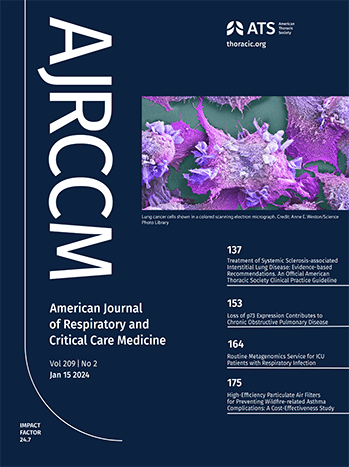解决造血细胞移植后闭塞性细支气管炎综合征早期检测的知识空白。美国胸科学会官方研究报告。
IF 19.4
1区 医学
Q1 CRITICAL CARE MEDICINE
American journal of respiratory and critical care medicine
Pub Date : 2025-06-26
DOI:10.1164/rccm.202506-1352st
引用次数: 0
摘要
背景:闭塞性细支气管炎综合征(BOS)是异基因造血细胞移植(HCT)的一种晚发性非感染性肺部并发症,通常在晚期诊断为严重肺损伤。在世界范围内,越来越多地利用HCT治疗血液病,导致BOS负担增加,特别是对社区肺科医生。对BOS的早期识别是降低发病率和死亡率的最佳机会,但由于对临床病程和疾病过程的不完全了解而受到阻碍。本研究声明的目的是调查我们目前对BOS的理解,并为BOS的早期发现确定研究议程。方法我们召集了一个包括社区代表在内的多学科小组,对已发表的文献进行深入调查,随后举行了一次在线研讨会。结果在自然史和发病机制、危险因素和临床诊断方法等相关主题中发现了主要的知识空白。该声明反映了对相关关键研究问题的已确定知识差距的详细评估,以及拟议的研究路线图,以促进从临床前到临床研究的跨学科合作。本文章由计算机程序翻译,如有差异,请以英文原文为准。
Addressing Knowledge Gaps in the Early Detection of Bronchiolitis Obliterans Syndrome After Hematopoietic Cell Transplantation. An Official American Thoracic Society Research Statement.
BACKGROUND
Bronchiolitis obliterans syndrome (BOS) is a late onset noninfectious pulmonary complication of allogeneic hematopoietic cell transplantation (HCT) that is often diagnosed in advanced stage with severe lung impairment. Increasing utilization of HCT for the treatment of hematologic diseases worldwide translates to an increasing burden of BOS, particularly for the community pulmonologist. Early recognition of BOS, which offers the best opportunity to mitigate morbidity and mortality, is hampered by incomplete knowledge of the clinical course and disease process. The goal of this research statement is to survey our current understanding of BOS and to define the research agenda for the early detection of BOS.
METHODS
We convened a multidisciplinary panel that included community representatives for an in-depth survey of the published literature followed by an online workshop.
RESULTS
Major knowledge gaps were identified within interrelated themes of natural history and pathogenesis, risk factors, and the clinical diagnostic approach.
CONCLUSIONS
This statement reflects the detailed assessment of identified knowledge gaps with associated key research questions, as well as a proposed research roadmap to stimulate cross-disciplinary collaborations from pre-clinical to clinical investigations.
求助全文
通过发布文献求助,成功后即可免费获取论文全文。
去求助
来源期刊
CiteScore
27.30
自引率
4.50%
发文量
1313
审稿时长
3-6 weeks
期刊介绍:
The American Journal of Respiratory and Critical Care Medicine focuses on human biology and disease, as well as animal studies that contribute to the understanding of pathophysiology and treatment of diseases that affect the respiratory system and critically ill patients. Papers that are solely or predominantly based in cell and molecular biology are published in the companion journal, the American Journal of Respiratory Cell and Molecular Biology. The Journal also seeks to publish clinical trials and outstanding review articles on areas of interest in several forms. The State-of-the-Art review is a treatise usually covering a broad field that brings bench research to the bedside. Shorter reviews are published as Critical Care Perspectives or Pulmonary Perspectives. These are generally focused on a more limited area and advance a concerted opinion about care for a specific process. Concise Clinical Reviews provide an evidence-based synthesis of the literature pertaining to topics of fundamental importance to the practice of pulmonary, critical care, and sleep medicine. Images providing advances or unusual contributions to the field are published as Images in Pulmonary, Critical Care, Sleep Medicine and the Sciences.
A recent trend and future direction of the Journal has been to include debates of a topical nature on issues of importance in pulmonary and critical care medicine and to the membership of the American Thoracic Society. Other recent changes have included encompassing works from the field of critical care medicine and the extension of the editorial governing of journal policy to colleagues outside of the United States of America. The focus and direction of the Journal is to establish an international forum for state-of-the-art respiratory and critical care medicine.

 求助内容:
求助内容: 应助结果提醒方式:
应助结果提醒方式:


